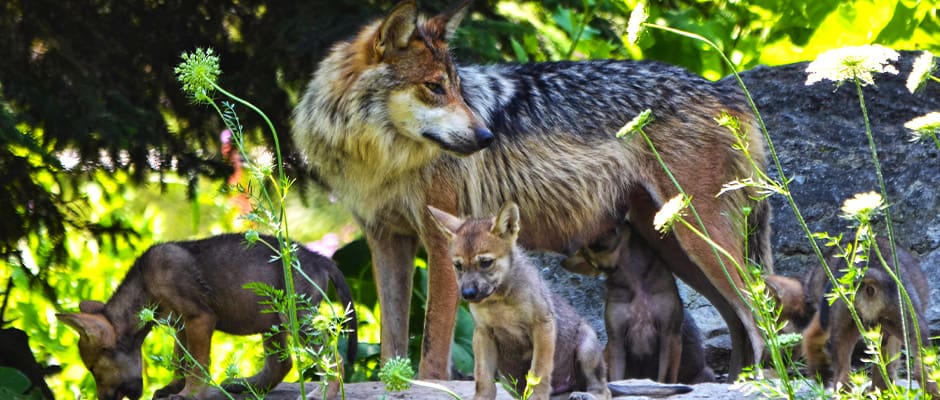Share this article
FWS Planning Mexican Wolf Releases Despite State Objections
Internal documents obtained from the U.S. Fish and Wildlife Service (FWS) on October 15 indicate that FWS plans to go forward with the release of up to 10 Mexican wolf pups and a mating pair of adult Mexican wolves into New Mexico, despite the New Mexico Department of Game and Fish’s rejection of permits for the releases.
Mexican Wolf Recovery
The Mexican wolf (Canis lupus baileyi) was listed as endangered under the Endangered Species Act in 1976. By that time the wolf was functionally extinct in the United States due to human development and extermination programs, with few remaining wild wolves in Mexico. To preserve the species, Mexico and the United States established a bi-national captive breeding program in 1977. The program was initiated with five wolves captured in Mexico.
In 1996, FWS identified the Apache and Gila National Forests in eastern Arizona and western New Mexico as suitable areas to reintroduce the species. The first release occurred in 1998 included 11 wolves, with additional releases in subsequent years. Surveys conducted in 2014 estimated there were at least 110 wolves in 19 packs in the U.S.
Recovery Plan
FWS created the first Mexican Gray Wolf Recovery Plan in 1982. The prime objective of the plan was “to conserve and ensure the survival of Canis lupus baileyi by maintaining a captive breeding program and re-establishing a viable, self-sustaining population of at least 100 Mexican wolves in the middle to high elevations of a 5,000-square-mile area within the Mexican wolf’s historic range.” Because FWS was unsure about how successful a reintroduction program would be when drafting the plan, the plan states that delisting may never be possible and therefore doesn’t provide a definitive recovery goal to de-list or down-list the wolf.
In November 2014, FWS revised their population goals for the Mexican wolf experimental population. They tripled the population target, increasing it from 100 to 300-325 wild wolves. The revision, outlined in FWS’ Record of Decision, also increased the experimental population area by 33,995 square miles, 28 percent larger the previously established area.
2015 Wolf Release Proposal
FWS crafted the “Replacement Release, Initial Release and Translocation Proposal for 2015” after approving the revisions to the Mexican wolf recovery goals in January 2015. The proposal outlined five potential management options for releasing Mexican wolves. Two of the proposed actions focused on releases in New Mexico; one called for initial releases and translocations of wolves to previously approved translocation sites in New Mexico, the other considered cross-fostering wolf pups in New Mexico to existing den sites. The full proposal, as well as public comments on the proposal, was sent to the New Mexico Department of Game and Fish along with a permit application to release Mexican wolves into the proposed areas.
Permit Rejection
FWS’ permit application was denied by the Director of the Department of Game and Fish. The Department stated that because they did not know how many wolves would be released or where they would be released, they could not ensure that issuing the permits would not conflict with Department policy.
FWS appealed the decision to the New Mexico Game Commission, arguing that the decision to deny the permits was arbitrary and not based on law or regulation. FWS pointed out in their filing that the director did not cite any statues, regulations or policies regarding conservation management to suggest that there could be conflict.
The Game Commission disagreed with that assessment and voted unanimously against FWS’ appeal. Game Commissioner Elizabeth Ryan stated during proceedings that they were not deciding the value of the wolf program or validity of federal policies, and were only determining whether the director made a “reasonable and rational” decision in rejecting the application.
Releases Planned
After the Game Commission’s decision, Sherry Barret, Mexican wolf coordinator for FWS, provided a written statement to The Albuquerque Journal in which she said, “ It is our policy to consult with the states and comply with state permit requirements except in instances where the Secretary of the Interior determines that such compliance would prevent carrying out our statutory responsibilities.”
On October 15, in a draft statement obtained by The Albuquerque Journal, FWS stated that, “Notwithstanding the New Mexico Department of Game and Fish’s decision to deny our permit, the Mexican wolf is still at risk of extinction.” The draft states that the Department of Interior has exempted the Mexican Wolf Recovery Program from its policy of complying with state permits and goes on to say “It is the U.S. Fish and Wildlife Service’s obligation under the law to recover the species, and reintroductions into the wild from the more genetically diverse captive population are an essential part of that recovery process.”
FWS has not made an official announcement indicating their plans for the Mexican wolf releases.
Sources: U.S. Fish and Wildlife Service, The Albuquerque Journal, E&E News Greenwire, New Mexico State Game Commission
This article was updated with minor corrections on October 19 and 26 based on input from state and federal sources.
Header Image: An adult Mexican wolf and pups. Image Credit: Chad Horwedel, licensed by cc 2.0








